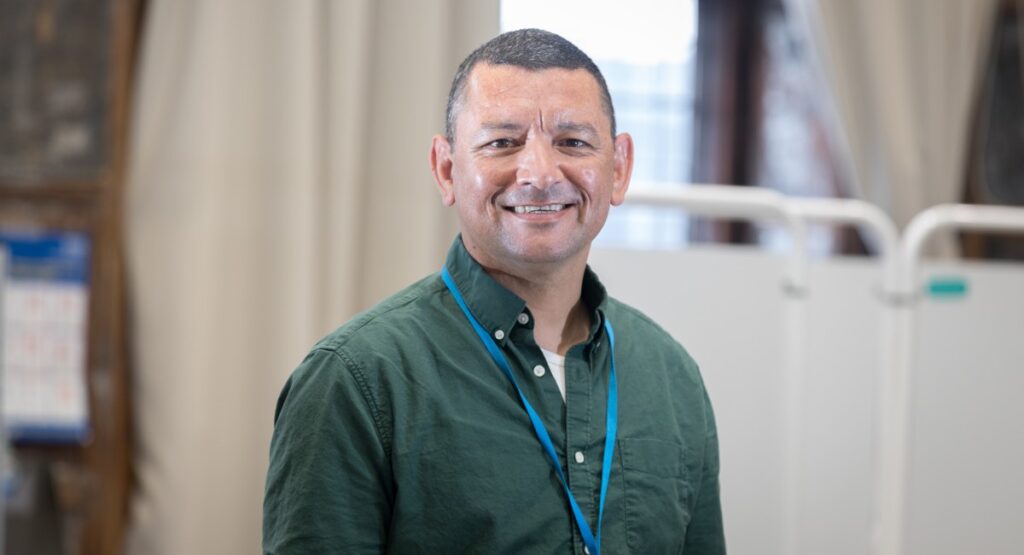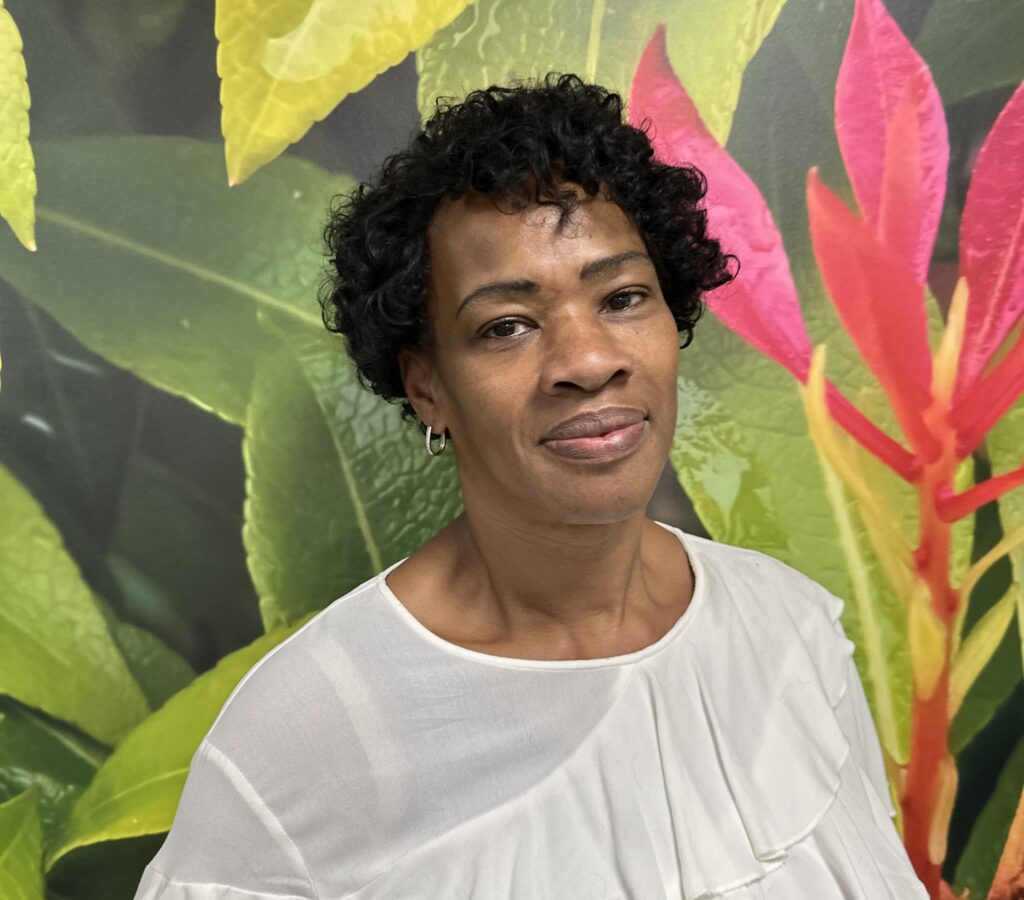The NHS and social care organisations in south west London are doing hundreds of things to help people stay well this winter – we’re sharing our winter plan – 10 points.
With record numbers of patients in hospital for this time of year and the number of people admitted with flu more than four times higher than in the same period 12 months ago, we speak to frontline staff to understand what it takes to vaccinate people who are eligible in south west London each year and why it’s so important.
More people in hospital due to winter viruses
“Winter’s a difficult time, because viral infections like flu, Covid-19 and RSV are much more prevalent. The number of people who come into hospital with respiratory infections rises significantly. This is why vaccinations are so important” explains Dr John Chinegwundoh who works as a respiratory consultant at Kingston Hospital.
He said: “These viruses can cause bronchitis or even pneumonia – serious conditions. A lot of planning goes into winter to make sure we can respond to the increase of people coming through our doors. We use extra beds, encourage staff to get vaccinated, recruit extra staff and we have additional doctors working. But ultimately prevention is always better than cure.”
A lot of planning goes into winter to make sure we can respond to the increase of people coming through our doors. We use extra beds, encourage staff to get vaccinated, recruit extra staff and we have additional doctors working.
Kingston Hospital respiratory consultant Dr John Chinegwundoh (pictured above)
Dr John Byrne, Chief Medical Officer for South West London Integrated Care Board, leads the local vaccination programme, which has ramped up for the winter period – including the delivery of the Covid-19, flu and additional RSV vaccinations. The RSV vaccination is available to pregnant women and people aged 70-75 for the first time this year.
He said: “Every vaccination counts – we’re looking at how we can reach out to everyone eligible across south west London to increase the number of people coming forward.”
More than 420,000 Covid-19 and flu vaccinations have now been delivered since the start of October – over 136,600 coronavirus jabs and nearly 284,400 flu vaccines.
We’re planning for the long-term to make sure our local communities are protected against life threatening illnesses.
South west London ICB’s Chief Medical Officer Dr John Byrne
Pop-up clinics getting vaccines to local people
Although winter is important, Dr Byrne is looking year-round at how vaccination rates can be increased across a range of areas to ensure people stay well.
Dr Byrne explained: “We’re working with partners to ensure we get out there and have the right conversations. We have low-uptake in certain areas, and we’re mapping that, alongside our data about our population to make sure we are being responsive to local people. We’re planning for the long-term to make sure our local communities are protected against life threatening illnesses.”
Bernhard Krisifoe, whose role includes the vaccination programme of people who are housebound or in care homes for south west London’s roving vaccination team, said: “Our biggest role is giving information to people, explaining why vaccines will protect them and helping them to make an informed choice.”
Mr Krisifoe’s vaccination teams go into churches, supermarkets and libraries to set up pop-up clinics to reach people who don’t necessarily visit their GP. His teams have been harnessing technology to make the programme run more smoothly, including using the Circuit app – a multi-stop route planner to save the team’s travel time.

Clinical supervisor Sara Patience said that “the act of giving the vaccination is probably one of the easiest bits of the job”.
She said: “It’s a lot of effort to get to the point of putting the needle into somebody’s arm.” On any given day, she and her team might vaccinate between 20 and 80 people depending on whether housebound people or care homes are being visited.

With pop-up clinics at Age UK in Wandsworth, Libraries in Pollards Hill and Colliers Wood or Tesco in Purley Way, Croydon – the roving vaccinators are now well-rehearsed.
She said: “It’s a well-rehearsed routine now. We set up a little clinic wherever we are. We approach people and say ‘would you like to be vaccinated’? We try to ask people and encourage them, and some people have quite a discussion about it.”
Her colleague Melissa Calvin, a roving team Clinical Supervisor, recalled a recent visit to a day centre where some of the attendees had dementia. The team spoke to a 90-year-old lady who hadn’t had a flu or Covid vaccination since 2021, because the last one ‘hurt her arm’. After having a chat with her and her next of kin about the benefits of vaccination and that older people are more at risk of becoming seriously ill with both covid and flu, they were reassured and decided that they would go ahead and have both vaccinations.
Having good conversations about vaccinations
Dr Byrne explains the importance of community partnerships to respond to low-uptake rates. “Our work with the voluntary sector continues this winter. This year, we’re using small sums of money to work with different communities to build relationships and trust and enable people to share their concerns.
“No two people will see vaccines in the same way – everyone has different experiences, different backgrounds and different views and different levels of trust and engagement with the NHS.”
Grants have been offered to grassroots voluntary sector organisations – 112 local organisations have been funded and over 300 events are taking place. These organisations run events that they know local people will be interested in.
We offer organisations training and materials about vaccinations to have good conversations. It means conversations are happening at a local level where trust is already established.
Sandra Copeland, from the Togetherness Community Centre in Merton, explained the benefits: “I think it’s really important that we work in partnership because we have the trusted relationships with people.
“We encourage people to talk to each other about their own experiences of having vaccines, so it can help challenge scaremongering information.

“We encourage people to talk to each other about their own experiences of having vaccines, so it can help challenge scaremongering information.
Sandra Copeland, of the Togetherness Community Centre in Merton
“We say it’s your choice to share your views and concerns, we’re not imposing that. And they do share, they’re quite open in that arena because they feel safe with each other.”
She added: “We say, take it home and have a conversation with the members of your household or extended family members and friends regarding what you’ve learnt, what you’ve understood and do it over the dinner table in a relaxed and informal way.”
In Croydon, conversations have been taking place to respond to the low-uptake rates in the borough. At the Croydon BME Forum, Desta came forward to share why he got vaccinated.
He said: “I got vaccinated because I wanted to protect my friends and family.” Whilst Hervin shared that he got vaccinated due to being at higher risk of serious illness because he had cancer and diabetes.
For Dr Byrne, everyone has a role to play: “Anyone who works in health care should be encouraging positive behaviour. If you’re a cardiologist or a respiratory physician or a nurse, you’ve got to be encouraging people to go and get vaccinated.
“And that’s why vaccinating care workers is so important, because they might encourage the people they look after to go and get vaccinated. It’s like a positive domino effect. Every contact counts.”
Help us start conversations and share accurate information on vaccinations by joining the #WhyWeGetVaccinated campaign. You can find posters and campaign materials to get involved in the campaign
